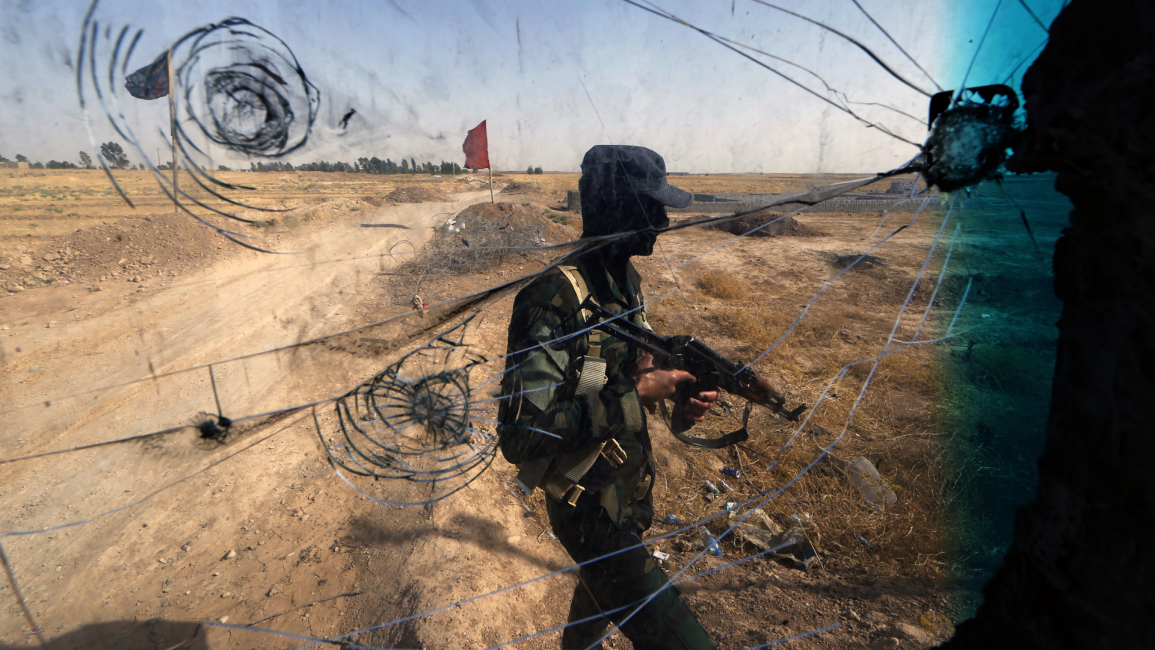How much territory has IS lost in Iraq?
How much territory has IS lost in Iraq?
The international coalition said on Tuesday that IS have lost 40 percent of its territory in Iraq, although some statistics suggest the amount is less.
2 min read
Contradictory stats have emerged surrounding the amount of territory lost to IS [Getty]
The Islamic State group (IS) has lost around a third of the territory it once controlled in Iraq and Syria, according to figures provided Tuesday by the US-led coalition.
"In Iraq, it's about 40 percent," said Colonel Steve Warren, spokesman for the international coalition which carries out daily air raids against IS and also provides training and weapons to local forces fighting the group.
"In Syria...we think it's around 20" percent, he said.
When the size of the so-called caliphate IS proclaimed 18 months ago was at its largest, the group controlled more territory in Iraq than in Syria.
"Taking together Iraq and Syria...they lost 30 percent of the territory they once held," Warren told reporters in Baghdad.
Since taking control of Ramadi in Iraq and Palmyra in Syria in May 2015, IS has been on the back foot most of the time.
A variety of Iraqi forces - including the Kurdish peshmerga, the Shia-dominated Popular Mobilisation paramilitary force and the federal forces - have reclaimed major urban centres, including Ramadi last week.
"We have retaken 40% of territory that ISIL once held. Enemy is weaker and on defensive. They have not gained one inch in Iraq since May," Warran wrote in a tweet on Monday.
Warren's estimate appears to differ significantly from a figure of 14 percent provided by the IHS Jane's think-tank, albeit predating the retaking of Ramadi.
According the think tank, losses in 2015 include large swathes of Syria's northern border with Turkey, including the Tal Abyad border crossing, which was the group's main access point to the Turkish border from their de-facto capital Raqqa.
Also prior to the capture of Ramadi, on December 19, Iraqi defence minister Khaled al-Obeidi said that IS went from controlling 40 percent of the country's territory to 17 percent.
Warren's comments concerning the 40 percent figure were first made on 21 December - coinciding with the release of the IHS Jane's report - when he added that the coalition had also managed to destroy 90 percent of the militant group's oil refinaries.
Agencies contributed to this report.
"In Iraq, it's about 40 percent," said Colonel Steve Warren, spokesman for the international coalition which carries out daily air raids against IS and also provides training and weapons to local forces fighting the group.
"In Syria...we think it's around 20" percent, he said.
When the size of the so-called caliphate IS proclaimed 18 months ago was at its largest, the group controlled more territory in Iraq than in Syria.
"Taking together Iraq and Syria...they lost 30 percent of the territory they once held," Warren told reporters in Baghdad.
Since taking control of Ramadi in Iraq and Palmyra in Syria in May 2015, IS has been on the back foot most of the time.
A variety of Iraqi forces - including the Kurdish peshmerga, the Shia-dominated Popular Mobilisation paramilitary force and the federal forces - have reclaimed major urban centres, including Ramadi last week.
"We have retaken 40% of territory that ISIL once held. Enemy is weaker and on defensive. They have not gained one inch in Iraq since May," Warran wrote in a tweet on Monday.
Warren's estimate appears to differ significantly from a figure of 14 percent provided by the IHS Jane's think-tank, albeit predating the retaking of Ramadi.
According the think tank, losses in 2015 include large swathes of Syria's northern border with Turkey, including the Tal Abyad border crossing, which was the group's main access point to the Turkish border from their de-facto capital Raqqa.
Also prior to the capture of Ramadi, on December 19, Iraqi defence minister Khaled al-Obeidi said that IS went from controlling 40 percent of the country's territory to 17 percent.
Warren's comments concerning the 40 percent figure were first made on 21 December - coinciding with the release of the IHS Jane's report - when he added that the coalition had also managed to destroy 90 percent of the militant group's oil refinaries.
Agencies contributed to this report.



